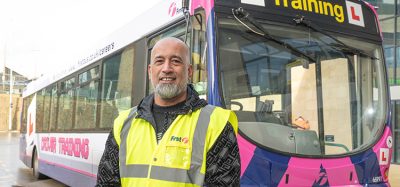Roadmap for delivering bus reform in Wales published
- Like
- Digg
- Del
- Tumblr
- VKontakte
- Buffer
- Love This
- Odnoklassniki
- Meneame
- Blogger
- Amazon
- Yahoo Mail
- Gmail
- AOL
- Newsvine
- HackerNews
- Evernote
- MySpace
- Mail.ru
- Viadeo
- Line
- Comments
- Yummly
- SMS
- Viber
- Telegram
- Subscribe
- Skype
- Facebook Messenger
- Kakao
- LiveJournal
- Yammer
- Edgar
- Fintel
- Mix
- Instapaper
- Copy Link
Posted: 6 March 2024 | Intelligent Transport | No comments yet
The bus reform roadmap outlines how the Welsh Government will work with partners and stakeholders to replace the existing system with franchised contracts.


The next steps to delivering bus reform for Wales have been set out by the Welsh Deputy Minister for Climate Change, Lee Waters.
The ‘Roadmap to Bus Reform: Towards One Timetable, One Timetable, One Ticket‘ builds on the proposals of the bus whitepaper that was published in March 2022 to radically shake-up the way that the public transport system works in Wales.
“We’re moving from a privatised system that puts profit before people towards one that will plan buses and trains together around the needs of passengers,” Lee Waters, Deputy Minister for Climate Change, with responsibility for transport, said.
The current system, where bus operators decide where to run services based on where they can maximise profit, will be replaced by a system of ‘franchised’ contracts.
Transport for Wales (TfW), local councils and the Welsh Government will work together to design bus networks that link key services and tie up with other buses and train timetables, all using one ticket.
Companies will then be able to bid to run the whole package of routes for an area, not just the ones that are the most profitable.
“This is the most far-reaching set of reforms taking place anywhere in the UK
“At the moment, using your car is easy but using public transport can feel like a hassle.
“Our aim is to create one joined up network, one integrated timetable which you can access using one ticket. That way, we will make it easier to understand how to use public transport, and it will make journeys seamless,” Waters added.
The roadmap sets out year-by-year targets of how the Welsh Government and Transport for Wales plan to approach the delivery of franchising bus services in Wales.
This includes how the organisations intend to work closely with partners and stakeholders, such as local authorities and bus operators, to design and deliver services that are easy to use, easy to access and well connected for communities across Wales.
This new approach is proposed to be rolled out on a geographical basis and will take several years to achieve.
Waters continued: “This marks a major milestone on our bus reform journey.
“For too long, Welsh bus services have been neglected, with passenger numbers steadily falling and some bus routes being cut.
“It’s not going to be an easy fix and it’s going to take time, but bus reform is central to creating an integrated public transport network and tackling transport poverty across Wales.
“Connecting up bus, rail, walking and cycling routes, we’ll make it easier for people to make more sustainable choices, which is essential if we are to hit our ambitious sustainability goals in Wales.
“The steps that we have outlined today puts people before profit and makes the right thing to do, the easy thing to do,” he concluded.
Industry responses
Bus Users UK
Welcoming the report, Barclay Davies, Bus Users UK’s Director for Wales, said: “Bus services will not change overnight, so it is helpful to manage expectations and outline the key milestones that will be delivered between now and 2035. We are pleased to see recognition of the barriers faced by many people when it comes to accessing services and the promise to engage with, and listen to, passengers to build the best possible network.
“There is a realistic recognition that funding is an ongoing challenge, meaning that changes can only be made incrementally when funding is available. We look forward to starting this journey to improved services and ensuring that the voices of passengers are heard at every stage.”
Confederation of Passenger Transport
Responding to the news of the report, Aaron Hill, Director of the Confederation of Passenger Transport (CPT) Cymru, said: “This roadmap is a welcome signal of intent from Transport for Wales and the Welsh Government, recognising the importance of a strong bus network to the wellbeing of Wales.
“However, bus operators across the country have faced huge challenges in recent years, and regulatory change alone will not change the economic reality of this.
“Our own research published [in 2023] shows that a minimum subsidy franchise – as used in Jersey – could strike the right balance between government control and using the skills and expertise of commercial operators to deliver maximum benefit for the public.
“Whoever controls bus services in Wales, we need carefully managed long-term investment and policies which encourage people to choose the bus over a car.”
Related topics
Journey Planning, Modal shift, Passenger Experience, Public Transport, Ticketing & Payments, Transport Governance & Policy, Travel & Passenger Information
Related modes
Bus & Coach
Related countries
United Kingdom, Wales
Related organisations
Bus Users UK, Confederation of Passenger Transport (CPT), CPT Cymru, Transport for Wales (TfW), Welsh Government
Related people
Aaron Hill, Barclay Davies, Lee Waters








